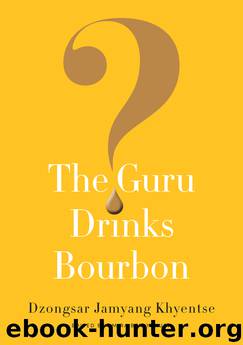The Guru Drinks Bourbon? by Dzongsar Jamyang Khyentse

Author:Dzongsar Jamyang Khyentse [Khyentse, Dzongsar Jamyang]
Language: eng
Format: epub
Publisher: Shambhala
Published: 2016-11-21T13:00:00+00:00
© Petr Balíček
DON’T LET THE SHADOW FALL
In the sutras it is said that a master, or a spiritual friend, with negative qualities is the biggest obstacle in your Dharma practice. You should not spend time with such people, nor talk to them. You should not even let their shadow fall over your limbs.
Once you take the initiation, once you take someone as your guru, then you must think, “This is my projection.” Until you have the ability and understanding to realize this is your projection, your judgment will overrule and you won’t have pure, open vision. You can still listen, and you can still be there, but without accepting the guru as your projection, it’s not advisable to take tantric teachings.
All that said, activities that appear to be all the wrong reasons for following a guru could turn out to be the right ones for a disciple with superior faculties.
WHY CAN’T THEY BE PERFECT?
Why are our human gurus so apparently fallible? Why can’t they be perfect like the Buddha? A human guru will often exhibit some of the inherent flaws and imperfections that we also struggle with, but as a result he or she will be a far more effective teacher than a “perfect” guru. Ironically, it’s human fallibility itself that provides the guru with the most effective tools. If a guru manifested as a completely perfect being, you might not be able to communicate with him or her because you are not perfect.
Gurus who go strictly by the book, who present themselves as perfectly well-behaved manifestations, could quickly become predictable. Students will learn how to hide from them and will know exactly what to expect. There would be no surprises. The Vajrayana is the path of the rug being pulled out from under your feet, so you need someone who knows how to do that. There has to be interaction for rug pulling to take place, so the guru must reside on some human level, which naturally includes flaws.
The point of the Buddhadharma is to guide us down a path that results in our becoming buddhas. From the Vajrayana point of view, our aim should be to become the guru, not to ensure endless rebirths spent at the feet of a buddha. More precisely, our aim is to realize the state of the guru, to discover the innate guru, to be the master of everything—our ego, emotions, impure perceptions, and dualistic thoughts. To become inseparable from the guru would be extremely difficult if the guru were inherently pure and the student inherently impure.
ABUSE OF MONEY, POWER, AND FAME
When people talk about bad gurus, they often focus on moral and ethical failings involving sexual abuse and alcohol. Alcohol is harmful in many ways, especially if the alcoholic is a guru. Not only does it harm the guru, but because this person is supposed to set an example and be a model for the community, drunken behavior might end up encouraging other alcoholics. And it goes without question that sexual abuse is destructive.
Download
This site does not store any files on its server. We only index and link to content provided by other sites. Please contact the content providers to delete copyright contents if any and email us, we'll remove relevant links or contents immediately.
| Confucianism | Feng Shui |
| I Ching | Jainism |
| Karma | Shintoism |
| Sikhism | Tao Te Ching |
| Taoism | Tibetan Book of the Dead |
| Zoroastrianism |
The Tao of Physics by Fritjof Capra(2268)
Human Design by Chetan Parkyn(2068)
The Diamond Cutter by Geshe Michael Roach(2058)
Feng Shui by Stephen Skinner(1937)
The Alchemy of Sexual Energy by Mantak Chia(1850)
Tao Te Ching by Lao Tzu(1834)
365 Tao: Daily Meditations by Ming-Dao Deng(1616)
Tao Tantric Arts for Women by Minke de Vos(1591)
Sun Tzu's The Art of War by Giles Lionel Minford John Tzu Sun(1531)
Sidney Sheldon (1982) Master Of The Game by Sidney Sheldon(1512)
Buddhism 101 by Arnie Kozak(1507)
Karma-Yoga and Bhakti-Yoga by Swami Vivekananda(1487)
The Analects of Confucius by Burton Watson(1428)
The Art of War Other Classics of Eastern Philosophy by Sun Tzu Lao-Tzu Confucius Mencius(1411)
The Way of Chuang Tzu by Thomas Merton(1360)
Tao te ching by Lao Tzu(1356)
The New Bohemians Handbook by Justina Blakeney(1340)
The Sayings Of by Confucius(1310)
Bless This House by Donna Henes(1267)
